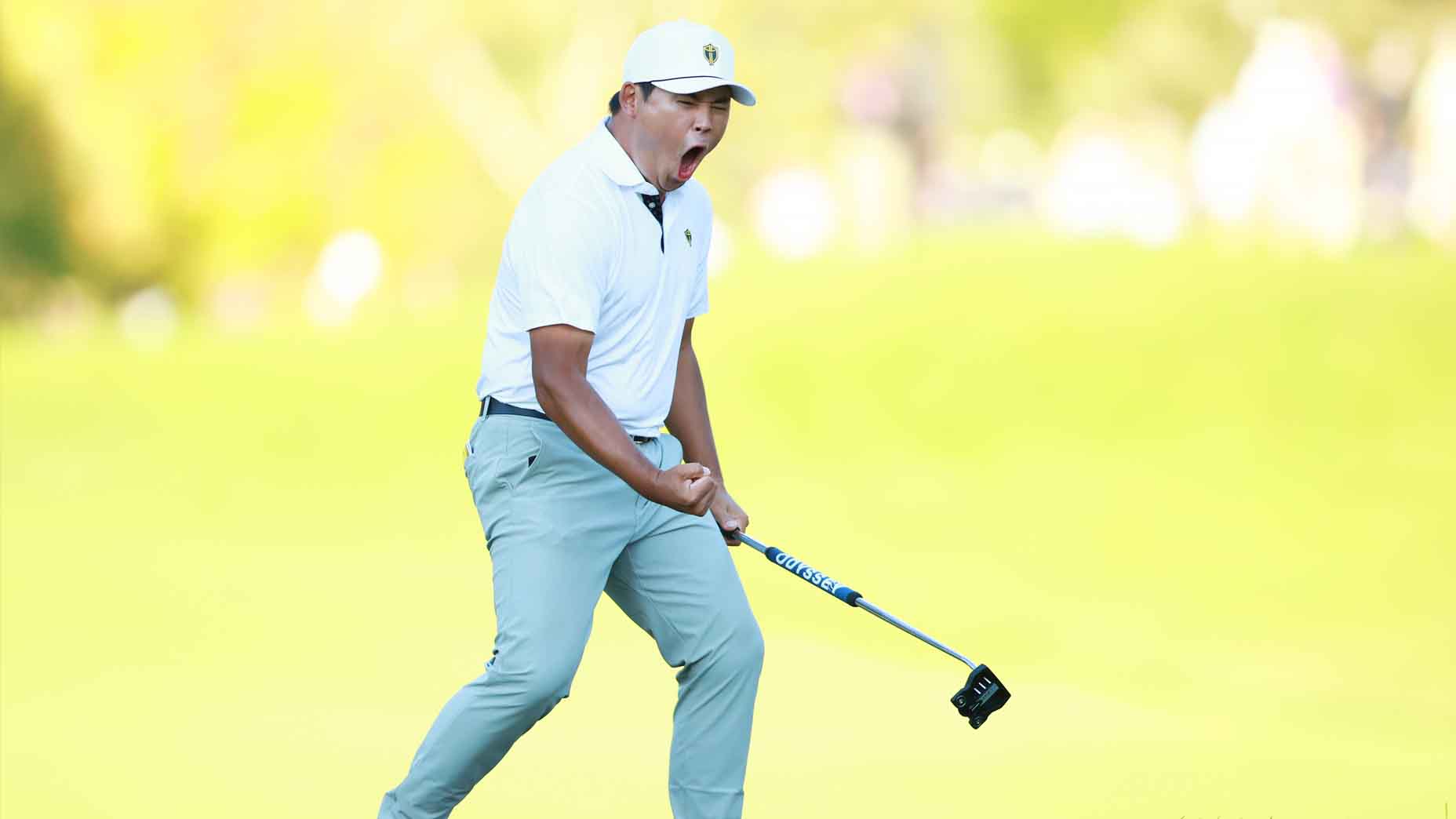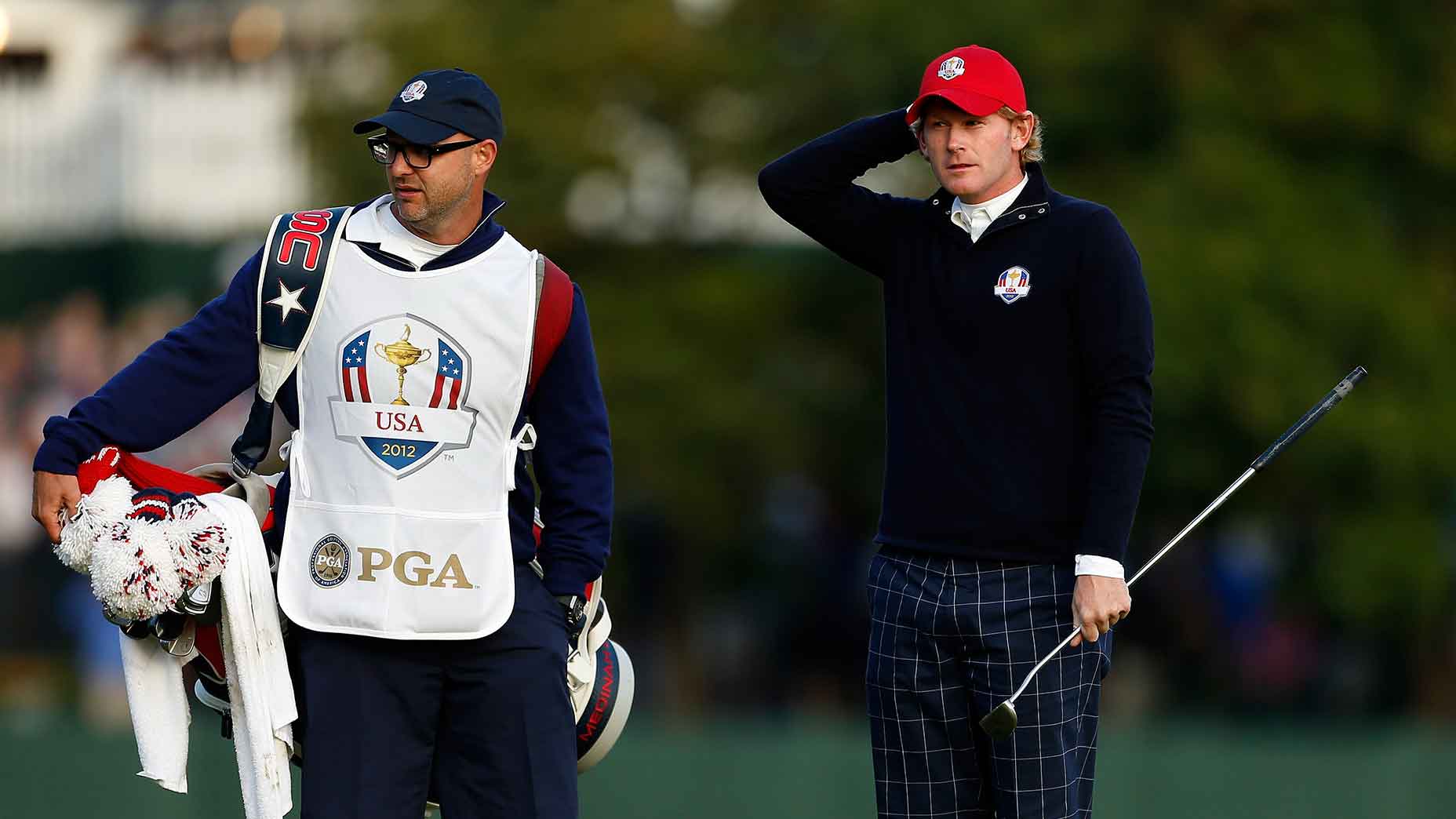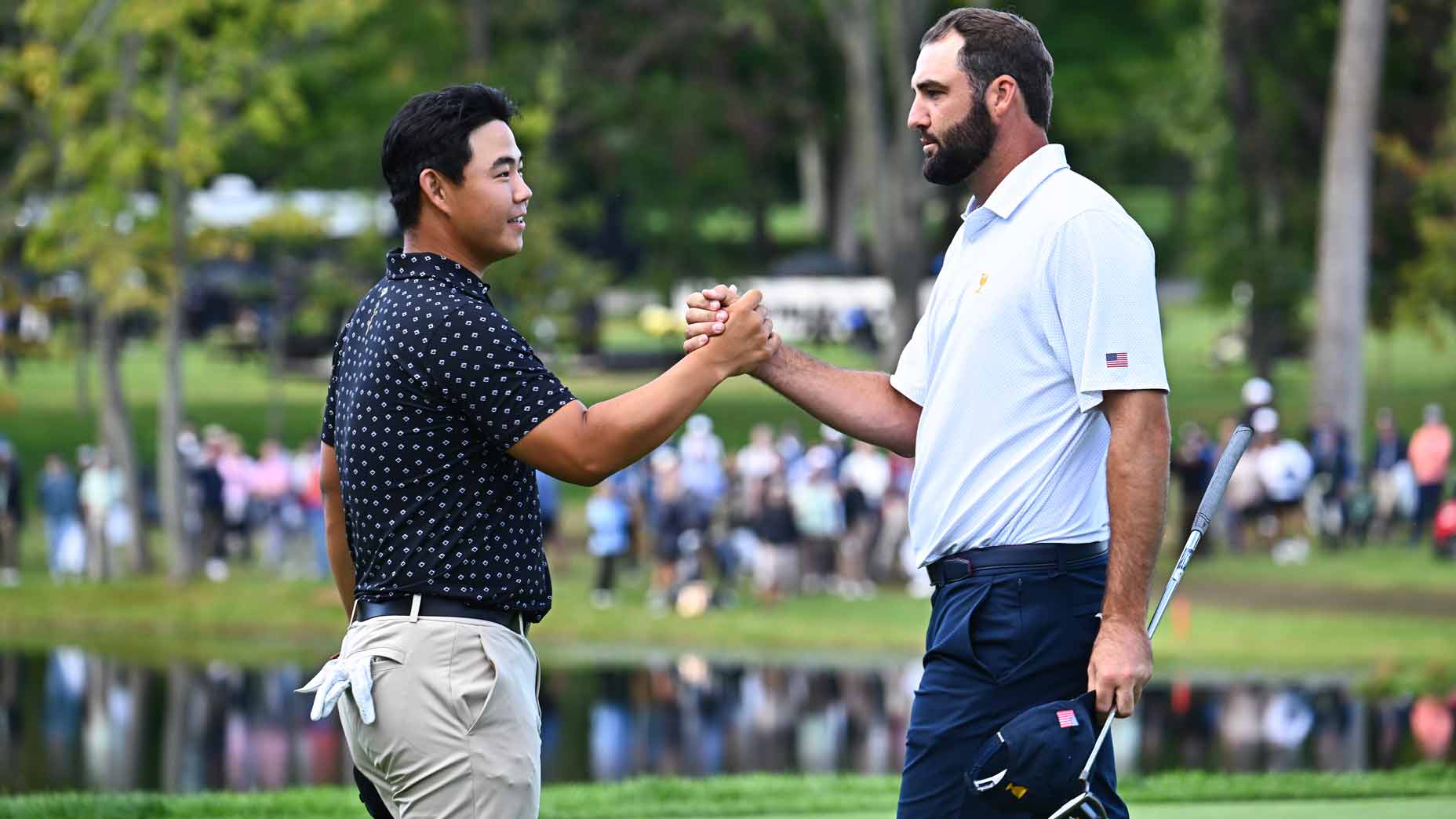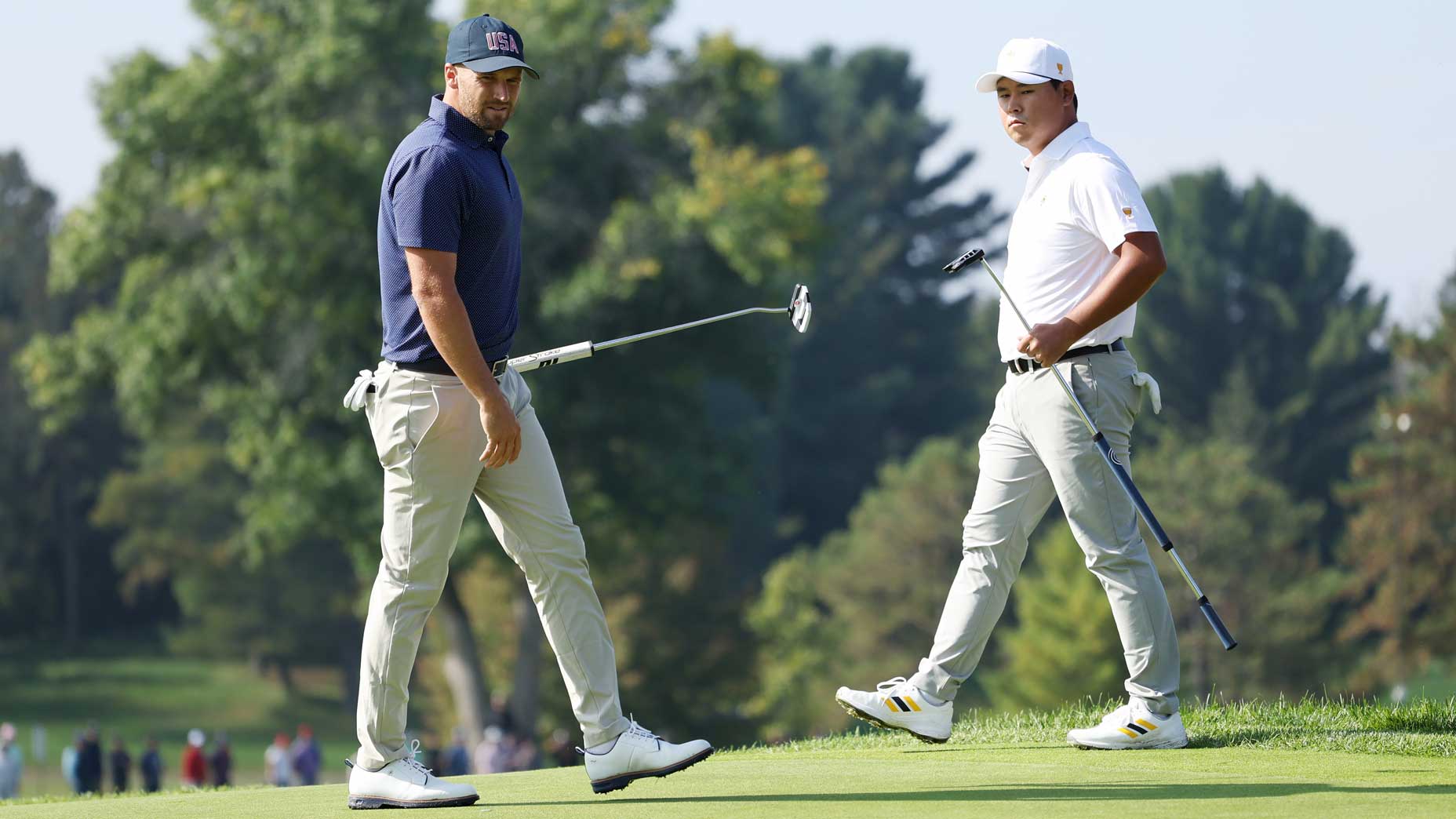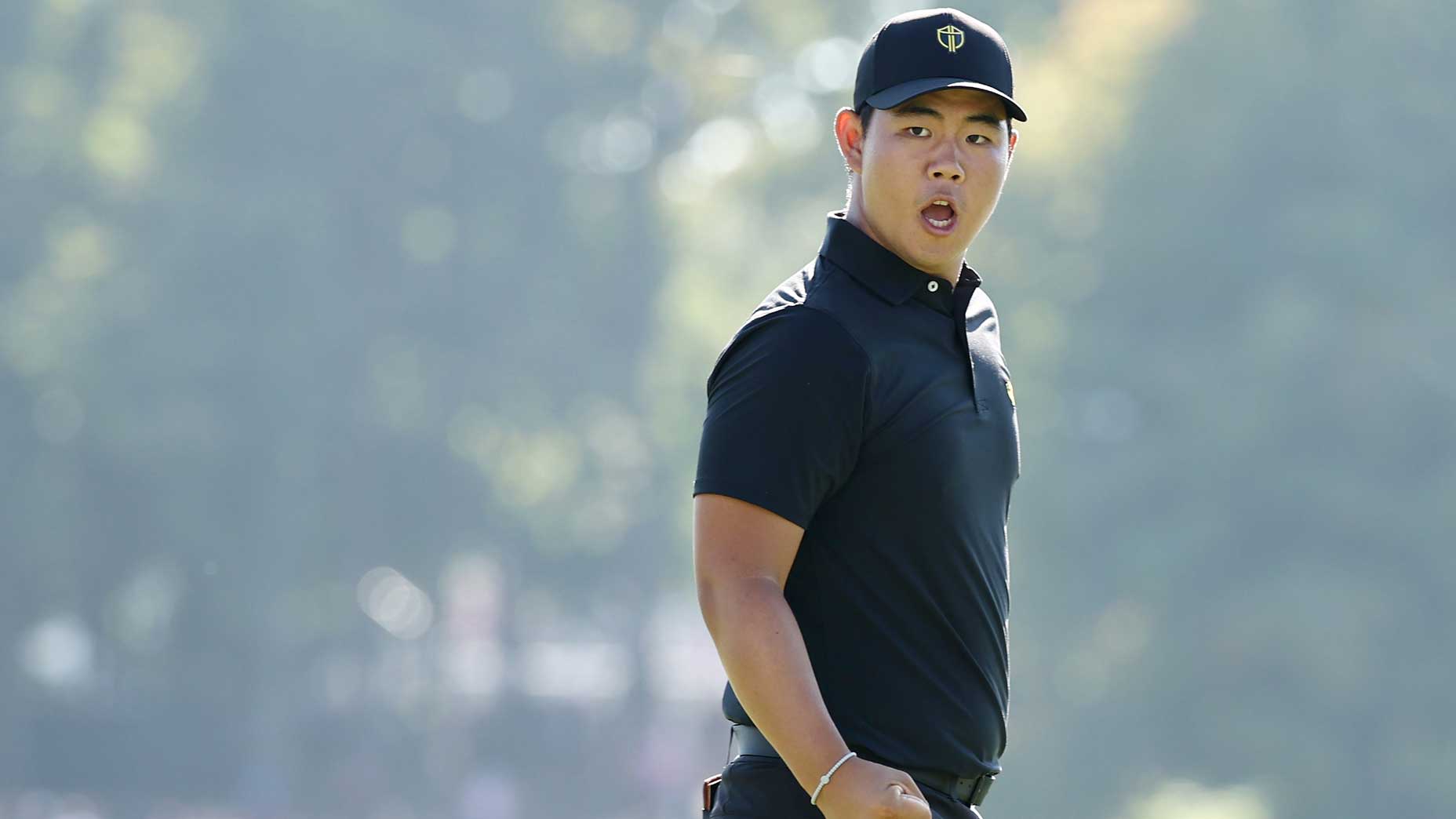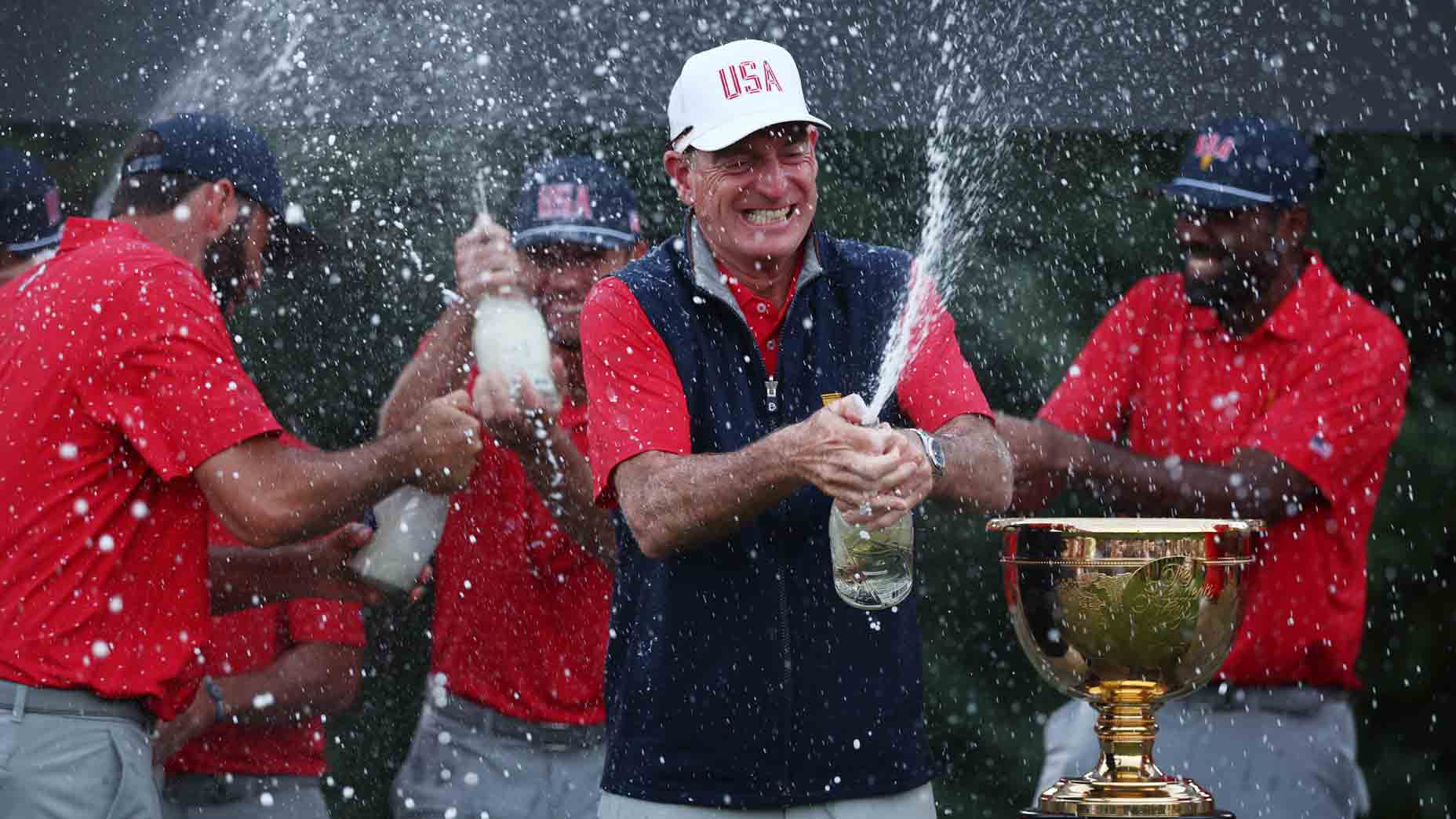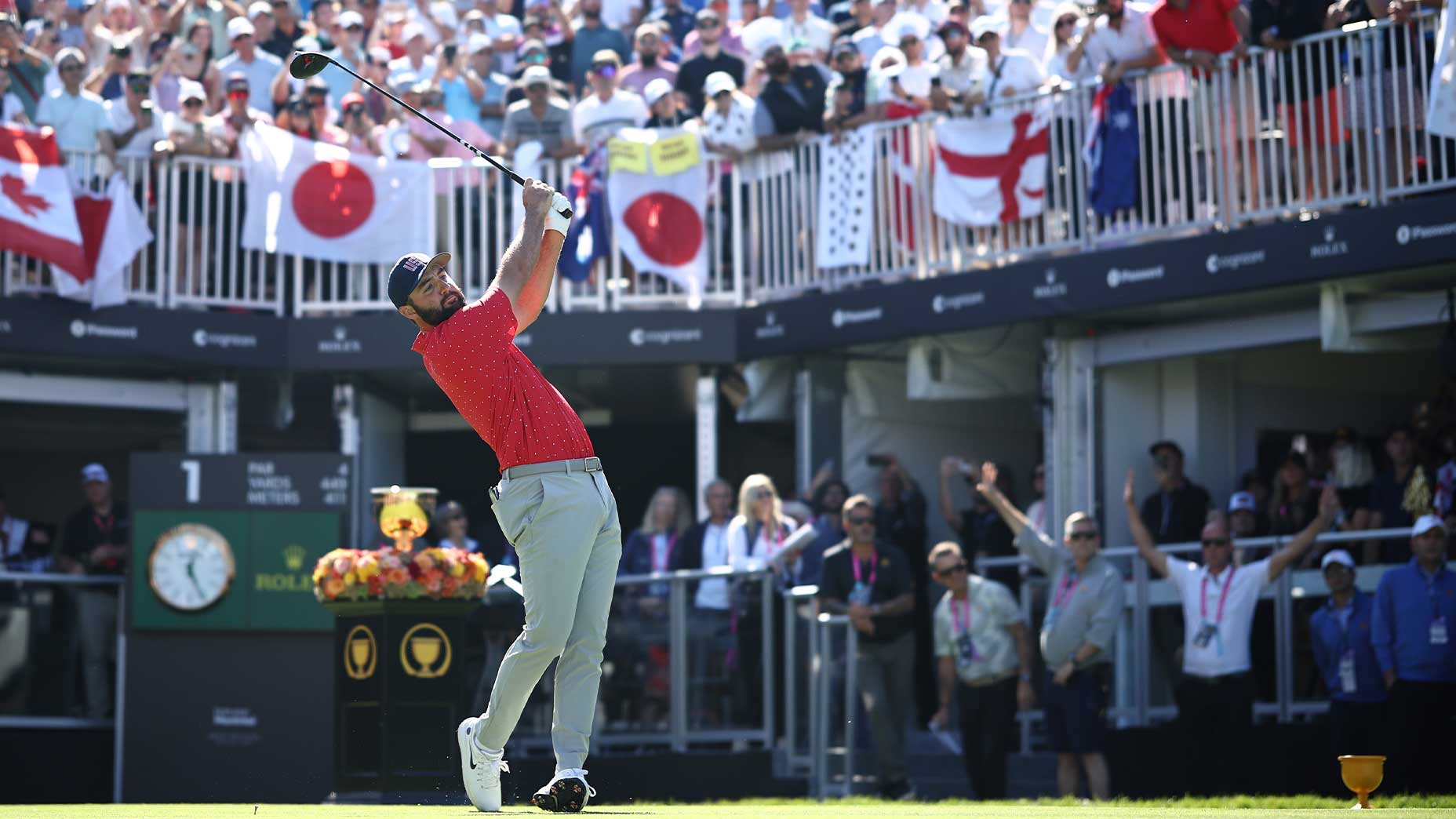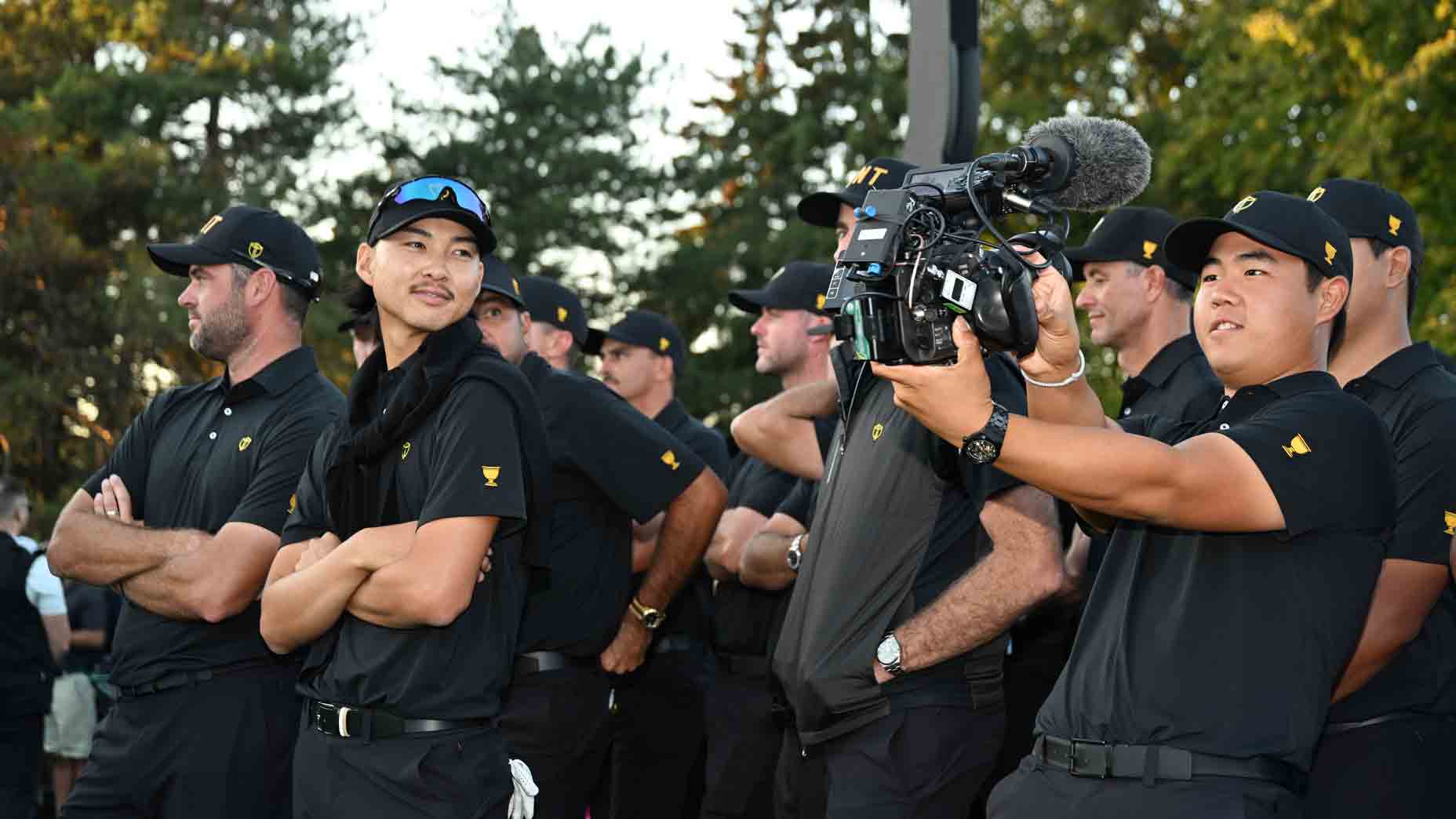MONTREAL — At the Presidents Cup the International Team is constantly reminded of one thing: They never win this event.
Almost never, that is.
But it can, in fact, be done. Need proof? It’s there in the locker room. He’s there in the locker room. A 5-foot-7, Presidents Cup-winning, Tiger-and-Phil-beating, undefeated legend. And he just might be the International Team’s secret weapon this time around.
First, a trip back in time. The year was 1998 and it was the third-ever playing of the Presidents Cup, now making its first trip outside the United States. Australia’s Royal Melbourne played host, 22-year-old World No. 1 Tiger Woods made his event debut for the U.S. and Jack Nicklaus was team captain. The rest of the American roster was stacked, too: World No. 2 Mark O’Meara, No. 3 David Duval, No. 4 Davis Love III, No. 10 Phil Mickelson, No. 11 Fred Couples — you get the idea.
But then something funny happened: the International team, captained by Peter Thomson, won the first three matches and never looked back. They gave the Americans a drubbing, unprecedented before and unmatched since. Their unlikely leader that week? Japan’s Shigeki Maruyama, who entered the week as a top talent from the Japan Tour but a relative unknown on the international stage; he was an event rookie and World No. 43, lower than the lowest-ranked American. No matter: He teamed up with two of the lowest-ranked golfers in the field and went undefeated, 5-0-0, beating some of the splashiest names in the game en route to a perfect week.
Maruyama’s dominant run began that Friday morning (the competition was just three days at the time) alongside foursomes partner Craig Parry, Aussie and World No. 53. The two took down Lee Janzen and Scott Hoch 3 and 2. That afternoon Maruyama played four-ball alongside countryman Joe Ozaki (World No. 55, brother of the better-known Jumbo Ozaki) and beat Mark Calcavecchia and John Huston 4 and 3. The Internationals opened up a 7-3 lead.
On Saturday, Maruyama and Parry went up against a star-studded American pairing of Woods and Couples, who succeeded only in forcing Maruyama to actually reach the 18th hole — but the International side still won, 1 up, as part of a 4.5-0.5 rout in the session that all but put the Cup to bed. That afternoon Maruyama and Ozaki took on the Americans’ other premier partnership, Duval and Mickelson. Again they walked off with a 1 up victory, and Maruyama left sporting the winning grin that gave him his nickname: the “Smiling Assasin.”
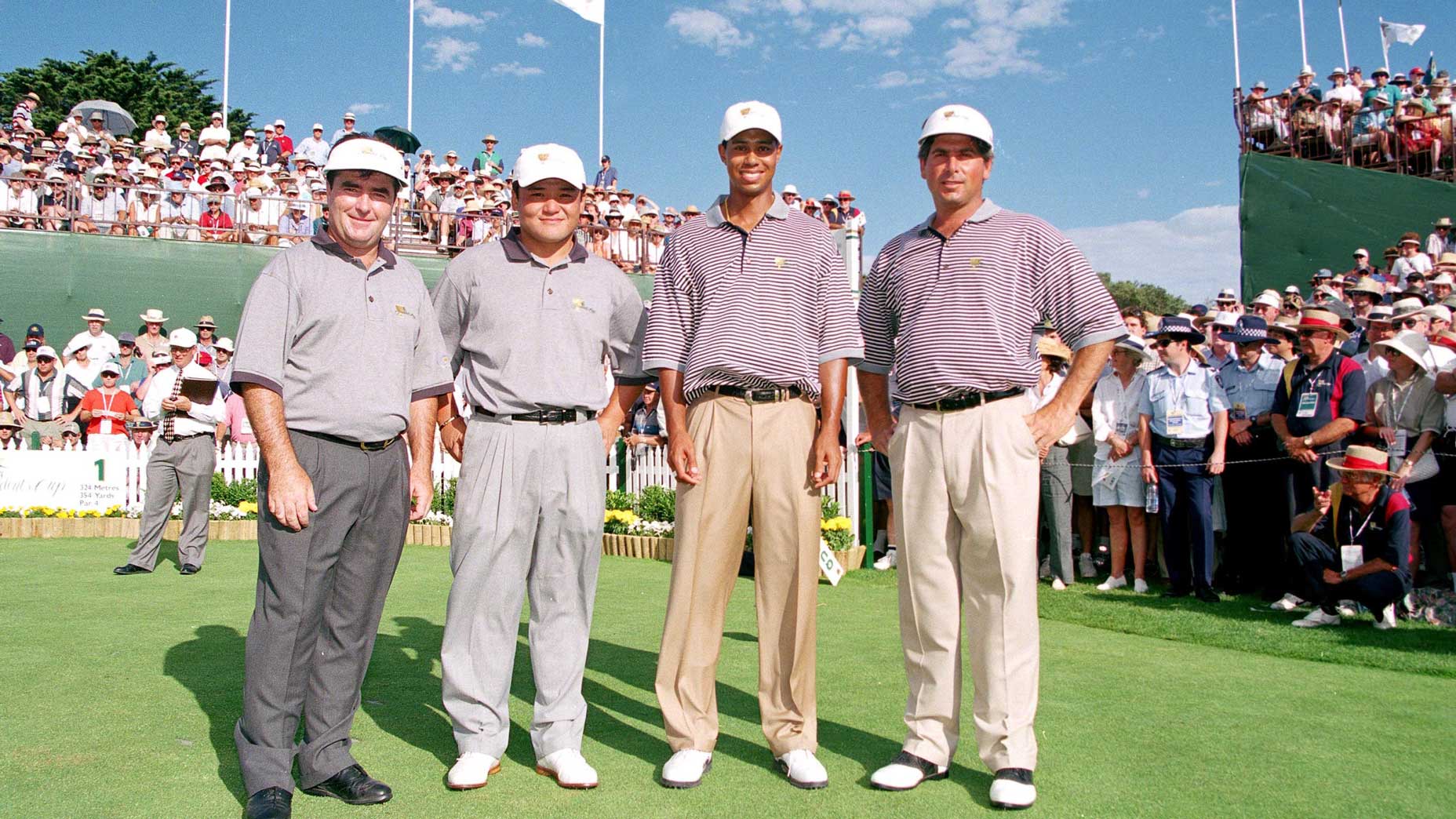
On Sunday, Maruyama finished his week by handling Huston to the tune of a 3-and-2 victory, capping off a performance that remains historic for many reasons. Maruyama’s 5-0-0 record was the first for an International player; only one player (Branden Grace in 2015) has matched it since. And 1998 remains the lone victory for the International team, which is particularly notable because it came in a 20.5-11.5 nine-point drubbing.
“As I was a rookie, and every American player was a superstar, I was not afraid of the matches,” Maruyama said in a recent interview with China Daily. He also recalled how Thomson had urged them to keep spirits high throughout the competition. “I would also smile a lot and yell ‘wow!’ to inspire the team,” Maruyama added.
“After the event was over, I thought it would be funny to show off, and I remember putting the Cup on my head and shouting happily.”
What followed is arguably the iconic photo of that win.
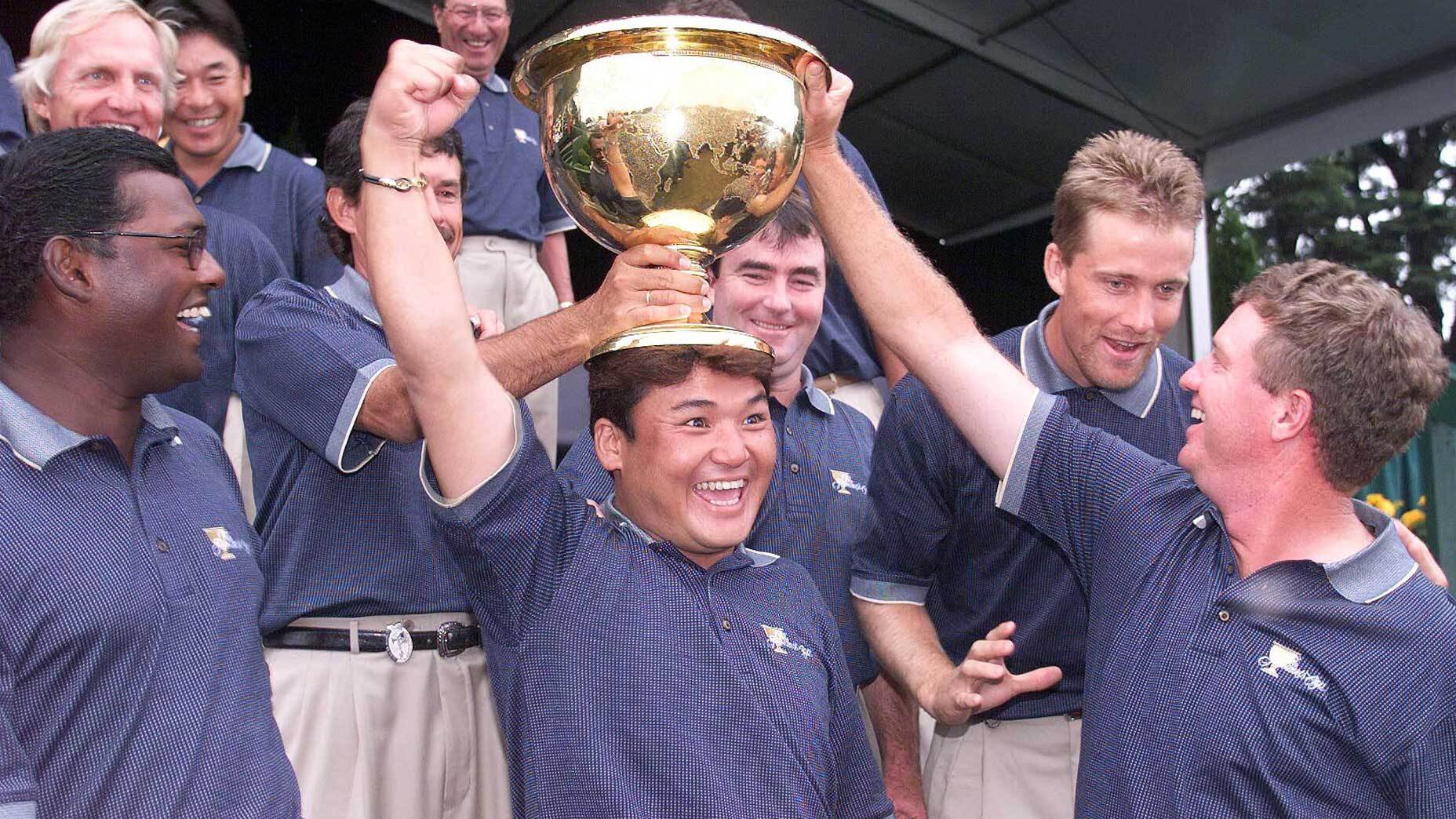
But two and a half decades of futility have followed. The International side earned a tie in 2003 but have lost nine in a row since then; an American victory at Royal Montreal this week would make 10. Maruyama played just one more Cup; he went 1-2-0 as part of a losing effort at Robert Trent Jones Golf Club in 2000. But his .750 winning percentage remains the highest of any International player who’s played multiple events.
And now he’s back.
MARUYAMA SAT QUIETLY at the end of the captains’ assistants press conference on Wednesday afternoon at Royal Montreal, the oldest of the nine men on stage. Fellow assistant Ernie Els, who went 3-1-1 as part of that 1998 team, recalled their celebratory party, how it stretched from the blackjack table to the plane and how it was lucky they were permitted to board at all. Furyk, who was on the losing side as a Presidents Cup rookie that week, is the U.S. captain this week. To the twentysomethings comprising this week’s teams, that win may feel like ancient history, but it hasn’t faded from the Presidents Cup’s collective memory. Not just yet.
Maruyama perked up as a reporter directed a question his way for the first time. Had he gotten to share any stories thus far with the team? Any wisdom? Had he gotten to gloat about that 5-0-0 week? He shook his head, then delivered a lengthy, thoughtful monologue in Japanese to the assembled (largely English-speaking) media. Fellow assistant Camilo Villegas leaned into his microphone as Maruyama finished his remarks.
“Get all that?” he added, drawing laughs.
A translator passed on Maruyama’s remarks. “I haven’t had a good chance to talk to all these guys all that much about that experience just because my English isn’t as fluent, so it’s hard to communicate,” he said. “I learned a lot of things that week, and I learned that my game could translate in the world, around the world, too, not just in Japan. If some of these guys want to have a talk about it or anything, I’m always open to it, and we can discuss it more in depth. I’d like to help the team in any way I can.”
Maruyama’s role is different as this point in his life; he’s long since moved on from a playing career. He won three times on the PGA Tour — in 2001, 2002 and 2003 — but lost full status after the 2008 season and returned to play more frequently in Japan. The 2012 season was the last in which he played more than a handful of events; 2016 was the last time he teed it up in any OWGR-sanctioned competition. But that didn’t mean he left golf; Maruyama remained involved behind the scenes and resurfaced this summer as Team Japan’s head coach at the Olympic Games, where one of his players, Hideki Matsuyama, won bronze.
(Maruyama also took a photo with longtime admirer Tommy Fleetwood, who called him one of his “childhood heroes.”)
A month later the International team announced that captain Mike Weir was bringing Maruyama aboard as the final member its staff, in part due to the positive rapport with the team’s lone Japanese representative.
“Mike [Weir] felt that Hideki was slightly different from the usual Hideki he was familiar with [in Paris],” Maruyama told China Daily, explaining what he brings to the team. “During practice, we tried to keep things light and enjoyable, without getting in Hideki’s way. We were giggling, and having a good time.
“Seeing Hideki laughing like that was unusual for Mike, so he mentioned that my presence was probably significant.”
Unlocking Matsuyama could prove pivotal in the team’s efforts to end its losing streak. He enters as their top-ranked player at World No. 7 — and with plenty of pressure on his shoulders.
“He’s so good, and you know, we are going to lean on him this week,” said Adam Scott, the team’s longest-tenured veteran. “We need him to deliver points. We need our best player to deliver points.”
Scott couldn’t help but grin when asked about Maruyama, too.
“Yeah, well, he’s quite a personality. You know, he’s a smiley face for us,” he said. “You know, he’s a great addition, obviously, for Hideki. But for me, too, and just generally a positive person, and that’s what you want around this week.”
Weir spoke to Maruyama’s addition, too.
“Hideki’s great. He’s one of our leaders obviously. And having Shigeki here, who was key in 1998, going 5-0 as a rookie to win. Seeing him, we competed against Shigeki for many years, and to see his face again back has been great for us,” Weir said Tuesday.
“He’s just a great character. I think it puts a smile on Hideki’s face. He’s been the lone Japanese player here for all the times he’s played. He might have someone from his team with him, but he hasn’t had a teammate. There hasn’t been two Japanese at the same time for him. So to have Shigeki here for him is great. He’s been fantastic in the team room.
“Everybody knows who Shigeki is,” Weir concluded. “Even the young guys know who he is. We showed them videos — in Australia obviously they called him the ‘Smiling Assassin’ back then. He’s a lighthearted guy and fun to be around.”
A lighthearted guy with a winning resume? Not a bad example for the rest of the locker room to follow.
“Oh, we let the boys in the locker room know,” said fellow assistant Trevor Immelman. “He’s absolutely been spoken about this week.”


